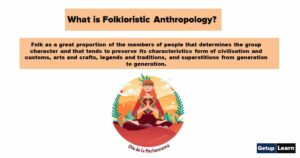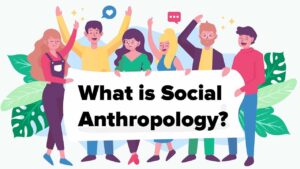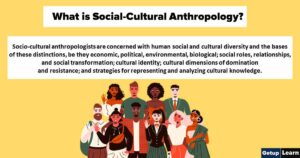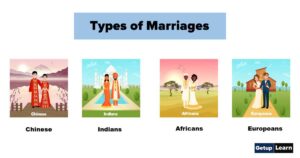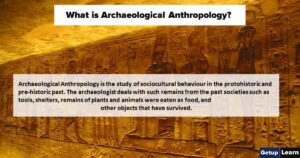Table of Contents
What is Anthropology?
The studies of humans, past and present called Anthropology. To learn and understand the full sweep and complexity of cultures across all of human history, anthropology draws and builds upon knowledge from social and biological sciences as well as the humanities and physical sciences.
Anthropology word made with two Greek words: Anthropos and Logos. Anthropos represent mankind or human being, while logos means to study or science With these two words together, anthropology is the study or science of human beings.

Table of Contents
Anthropology is the study of various elements of humans, including biology and culture, in order to understand the human origin and the evolution of various beliefs and social customs. The term anthropology is a combination of two terms ‘anthropos’ and ‘logus’, the former meaning human and the later meaning discourse or science.
Thus anthropology is the science or discourse of man. It is the science or discourse of human beings. Aristotle first used the term ‘Anthropologist’.
Definition of Anthropology
These are some definitions of anthropology given below:
[su_quote cite=”Jacobs and Stern”]Anthropology is the scientific study of physical, social and cultural development and behaviour of human beings since their appearance on this earth.[/su_quote]
[su_quote cite=”Clyde Kluckhohn”]Out of all the sciences which study various aspects of man, anthropology is the one which comes nearest to the total study of man.[/su_quote]
[su_quote cite=”M Jacob and B T Stern”]Anthropology is the scientific study of the physical, social and cultural development and behavior of human beings since their appearance on earth.[/su_quote]
Nature of Anthropology
These are the nature of anthropology which discussed below:
- Biological and Social of Anthropology
- Comparative, Integrative and Holistic Nature
- Anthropology as a Science
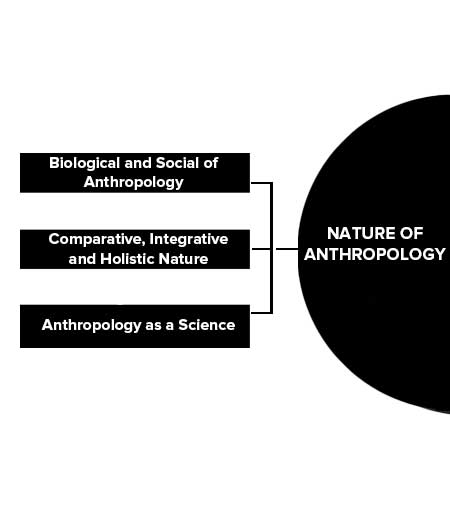
The definition given by Herskovits, the term ‘man’ implies human as a ‘biological organism’ and ‘works’ stands for ‘culture’. Anthropology studies organic or biological factors as well as social/cultural factors of human beings.
Both factors are equally important and relevant since anthropology studies biological factors like human origin, evolution, and variation as well as social-cultural factors like society, culture, etc. As it accepts and uses the general principles of Biological and Social Science, it is considered a bio-social science.
Comparative, Integrative and Holistic Nature
Anthropology is more than a biosocial science. It has many other peculiarities. Examining the contents of shown in the box, it becomes clear that different subjects deal with any one particular aspect of human being. But, anthropology, on the other hand, considers human life in totality.
Most of the time, people think that anthropologists study fossils, and non-industrial and non-western cultures alone which is a misconception. As a matter of fact, anthropology is a comparative and integrated discipline that examines all societies, ancient and modern as well as simple and complex.
It is also considered a holistic science as it studies the whole of human conditions: past, present and future as well as biology, society, languages and culture.
Anthropology as a Science
As anthropologists deal with human social life and culture, they give prime importance to the fieldwork method. Fieldwork is the backbone of anthropological research Anthropologists use participant observation as one of the important techniques to collect data. Biological and physical scientists need a laboratory for conducting experiments.
But for anthropologists, the field is the laboratory that includes any place where peoples and cultures are found. Fieldwork is the heart and soul of anthropology as it is a field of science. It is a condition where the physical presence of the anthropologists is considered mandatory.
It helps to observe phenomena through one’s own senses. During fieldwork, an anthropologist goes to the field, stays with the people with whom he wants to interact, learns their native language observes the phenomena under study and records them systematically.
4 Main Branches of Anthropology
Anthropology includes four 4 main branches of anthropology as given below:
- Biological Anthropology
- Social Cultural Anthropology
- Archaeological Anthropology
- Linguistic Anthropology
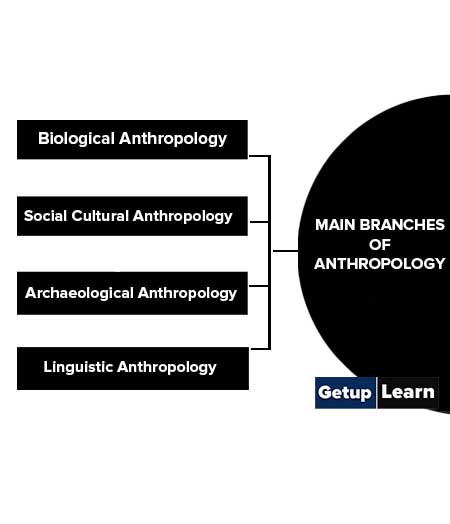
Biological Anthropology
Biological anthropology gives an opportunity to understand the physical differences and changes among humans. Biological anthropology is the branch of Anthropology that considers humans as biological organisms. As the name indicates, it studies the biological and physical characteristics of humans.
Biological anthropology starts with the study of the origin and evolution of humans and analyses their diversity. It also examines the biosocial adaptation of different human populations living in different geographical and ecological settings.
The knowledge of different branches of Biological Anthropology will help us to examine how it deals with human evolution and variation.
Human Paleontology or Paleoanthropology
Human Paleontology studies the fossil evidence of human skeletons of different stages and thereby reconstructs the evolutionary history of humans. This helps in the classification and comparison of the fossils of different stages to determine the link between modern humans and their ancestors.
Human Genetics
To understand how evolution works, it is most important to know the mechanisms of heredity. Human genetics is the branch of biological anthropology it deals with inheritance and variation.
Forensic Anthropology
Morphological and genetic variations among humans help biological anthropologists to identify individuals, criminals, victims of mishaps and natural calamities, etc. The branch of anthropology specialized in such area is called Forensic Anthropology.
Social Cultural anthropology is the study of human society and culture. It describes, analyses interprets and explains the social and cultural similarities and differences. Social-cultural anthropology is concerned with the study of social institutions such as family, marriage, kinship, religion, economic organization, political organization, law, and the relations between such institutions.
Social-cultural anthropology is the study of relations and patterns of life among different types of people. The study is based on some facts, collected through direct investigation from the field using anthropological techniques.
Different sub-fields have emerged in social-cultural anthropology to contribute to the total understanding of culture in all its dimensions. Some such sub-fields are the following:
- Familial Anthropology
- Economic Anthropology
- Political Anthropology
- Anthropology of Religion
- Ecological Anthropology
- Medical Anthropology
- Development Anthropology
Familial Anthropology
It makes a comparative study of families of different societies and cultures. It studies the origin of the family, its types, and functions in different societies. Marriage is the basis of family and hence Familial Anthropology also studies different types of marriage, ways of acquiring mates, and marriage payments in different societies.
Economic Anthropology
All aspects of culture are closely related. Economic activities play an important role in social organization. Sometimes the sudden change in the economic sector leads to radical change in the structure and function of other sectors also. Economic Anthropology studies the economic organization of human societies ranging from pre-literate food-collecting economy to modern industrial economy.
Political Anthropology
The administrative setup prevailing in society also plays shaping ways important role in shaping the ways of life of the people. The branch of social-cultural anthropology that deals with the types and forms of government, state as well as stateless political organizations, regulations including mores and norms as well as customs and laws, nature of sanctions including punishment and rewards, etc. are known as political anthropology.
Anthropology of Religion
Beliefs and practices are related to supernatural powers and forces play an important role in shaping the culture of a group. Beliefs and practices associated with supernatural elements, rituals and performances, etc., come under the purview of this specialized area of anthropological study.
Ecological Anthropology
Ecological Anthropology studies the inter-relationship between humans, culture and environment. Environment plays an important role in shaping the culture of the people. Relationship of culture and environment, natives’ attitude of their relationship with the environment, etc., are studied in Ecological Anthropology.
Medical Anthropology
Medical Anthropology is concerned with the bio-cultural understanding of humans and their works in relation to health and disease. Local beliefs regarding health and disease, treatment, and preventive measures are some of the aspects studied in Medical Anthropology.
Development Anthropology
This sub-field addresses some of the basic concerns of human society in terms of welfare, progress, and development, with the ultimate aim to ensure security and decent livelihood for human beings. Hence, the questions of poverty, inequality, human welfare, social justice, human development, and environmental sustainability become the core concerns under this specialization.
Archaeological Anthropology
The third branch of anthropology is archaeological anthropology. This branch is equally relevant like the other three and more so because it deals with humans and their culture since the time of their inception. It too, like biological anthropology, concerns itself among other things with the origin and development of human beings but with an entirely different perspective of course.
The word archaeology is derived from two Greek words- “arkhaios” which means ancient and “logos” means study. In archaeology, the time period covered are prehistoric, proto-historic and also later periods like what is called civilization. Both anthropology and archaeology use scientific methods to recover and construct human beings’ past through deductive and inductive processes.
Today archaeological anthropology also deals with palaeoanthropology, ethnoarchaeology, settlement archaeology, etc. as the gamut of knowledge accumulated from the reconstruction of the past has become vast.
In recent times archaeological anthropology has been studying the history of cultures and its processes through studies like new-archaeology, processual archaeology and the latest being post-processual archaeology. Much earlier the subject only depended on methods like absolute and relative chronological dating to know about both physical and material cultures.
Later demographic conditions and environmental order, looking into subsistence patterns, economy, etc. also fell under the purview of study in archaeology. To put it simply, archaeological anthropology seeks to gather knowledge about the origin and development of human beings and their culture in its own distinctive way.
????What is Archaeological Anthropology?
Linguistic Anthropology
Linguistic Anthropology is another branch of anthropology that studies human languages. The branch of anthropology we will talk about lastly is linguistic anthropology. Linguistic anthropology is an interdisciplinary science in anthropology. It deals with the study of language and how it can be viewed as part of the cultural reality in human society.
The subject acknowledges language as an accomplishment that furthers human social behaviour and activities. Linguistic anthropology as an interdisciplinary subject works hand in hand with anthropological linguistics, ethnolinguistics, and socio-linguistics.
This linkage helps in the investigation of how language affects the creation and management of individual and group identities, social norms, and ideals and also concentrates on the biological implications language has in the functioning of sc.-.ciety.
Initially, y this branch started off with the attempt to study the origin, evolution, and development of languages and the salvaging of languages that were on the verge of disappearing. Eventually, it progressed to embrace various facets of language and how it influences even the minutest concerns of social life.
????What is Linguistic Anthropology?
YOU MIGHT ALSO LIKE
- What is Anthropology?
- Branches of Anthropology
- What is Social Anthropology?
- Scope of Social Anthropology
- Nature of Social Anthropology
- What is Social Cultural Anthropology?
- Theories of Sociocultural Anthropology
- What are Archaeological Sites?
- Types of Archaeological Sites
- What is Linguistic Anthropology?
- What is Marriage?
- Types of Marriage
- What is Family?
- Types of Family in Sociology
- Functions of the Family
- Folk literature
- What is Biological Anthropology?
- Biological Anthropology Fields of Study
- What is Social Anthropology?
- Definition of Social Anthropology
- Scope of Social Anthropology
- Nature of Social Anthropology
- What is archaeology?
- What is Archaeological Anthropology?
- Process of Archaeology
- Types of Archaeology Sites
- Linguistics Language
- Linguistic Culture
- Types of Marriages
- What is Kinship?
- Types of Kinship Groups
- What is Folkloristic Anthropology?
Anthropology is the scientific study of the physical, social and cultural development and behaviour of human beings since their appearance on this earth.
What are the 4 major fields of anthropology?
These are the 4 4 major fields of anthropology Biological Anthropology, Social Cultural, Anthropology Archaeological, Anthropology, Linguistic Anthropology.
What is anthropology best definition?
Out of all the sciences which study various aspects of man, anthropology is the one which comes nearest to the total study of man.


